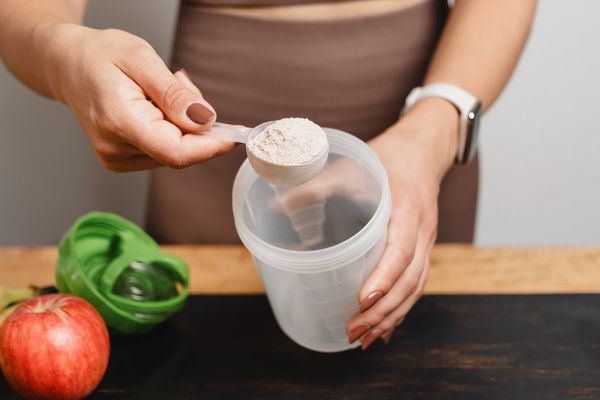If you're among the 40 percent of Americans who made New Year's Resolutions, congratulations! You're on your way to better health and motivating yourself to improve in the new decade.
And you're more likely to get there if you really think you can pull it off. People who believe in themselves are 10 times more likely to change with a resolution, reports CNN.
The list of popular resolutions seems to grow each year. Maybe that's because life is getting more complicated. Among the more common ones are cutting down on technology, reading more, learning a new skill or hobby and spending more time with family and friends.
Those all pay off, of course. But when it comes to resolutions for better health, the payoffs can be life-altering and can make the difference between sickness and wellness. Consider them the biggest gift you can give yourself.
Read more: Big Resolutions, Small Changes: What Science Tells Us About Changing Our Behavior.
With that in mind, here are five fabulous health resolutions that give you a big bang for your efforts:
Give up alcohol. It helps your whole body, right down to your DNA.
Although a small amount of wine or other alcohol can be good for your heart, more than that might raise your blood pressure and levels of triglycerides (fats in the blood) and increase your risk of heart attack and stroke.
Drinking too much can affect your brain's function, interfering with its communication pathways. It's also harmful to your liver and can lead to fatty liver, cirrhosis and other problems.
Too much alcohol can raise your risk of certain cancers, including breast, mouth, throat and esophageal.
Extra calories from alcohol can contribute to obesity and raise the risk of developing diabetes.
Although alcohol might help you fall asleep faster, it interferes with the quality of your sleep, disrupting the sleep cycle and causing restlessness and frequent wakings.
Pet a dog. You don't have to own one to feel good.
You might have heard that dog lovers are less lonely and live longer. Owning a dog can lower your blood pressure and decrease your risk of cardiovascular disease. Learn more about Surprising Ways Owning a Dog Is Good for Your Health.
But what if you don't want to or can't own one? Reach out and pet someone else's dog instead. Just the act of petting a dog (even if it's not real) can help quell anxiety and depression and help you feel less stressed. (That's why this robotic dog was invented.) Experts say that just 10 minutes of petting a dog is enough to reduce cortisol, a major stress hormone. (That's one reason therapy dogs are so effective.)
Quit smoking. The benefits of giving up this habit are colossal and can happen in as little as one hour after you quit.
Smoking affects your vision and the health of your mouth, skin, heart, lungs and even your immune system.
Within just one hour of quitting, your heart rate drops and returns to normal, along with your blood pressure. Additionally, your circulation starts to improve. In just 12 hours, your body rids itself of harmful carbon monoxide (found in cigarette smoke).
Quitting can help return your white blood cell count to normal and improve blood flow to wounds. It can prevent new DNA damage from occurring and may even repair damage that's already been done, helping to lower your cancer risk.
When you stop smoking, you're better able to fight off colds and infections. That's partially due to the cilia—the small hairs in your trachea that keep air passages clean—which begin to regenerate and heal.
Within nine months of quitting, your lungs can significantly heal themselves. After one year, your risk for heart disease is cut in half and becomes the equivalent of a nonsmoker's after 15 years.
Exercise more. You need not spend endless hours a day at the gym; any activity is better than none. Let us count the ways exercising can improve your life.
People who exercise burn calories. Burning calories helps prevent excess weight gain and helps you maintain your weight or weight loss.
Exercise helps lower your risk of heart disease by preventing high blood pressure, boosting high-density lipoprotein cholesterol and decreasing unhealthy triglycerides.
Moving more helps manage depression, anxiety, arthritis and many types of cancer.
Exercise can help prevent falls and boost cognitive function.
By delivering nutrients and oxygen to your tissues, exercise can boost your energy levels.
Sleep benefits from exercise, too: Regular physical activity can help you fall asleep faster and improve the quality of your sleep.
Adding strength and resistance training to your regimen can help maintain strong bones and prevent sarcopenia, a loss of muscle tissue that's part of the natural aging process.
Manage stress. Stress puts your body at high alert and over time can lead to chronic health problems, including headaches, heart problems, high blood pressure, upset stomach, sleeping issues, muscle tension, weight gain or loss and more. Learn more about what happens if stress is left untreated.
Many techniques can help lower stress and promote inner calm including meditation, yoga, psychotherapy, tai chi, qigong, exercise, deep breathing and guided imagery.
Practical lifestyle tools to manage stress can also help. These include planning ahead, noticing when you feel stressed, talking to friends and family and taking time to relax.







